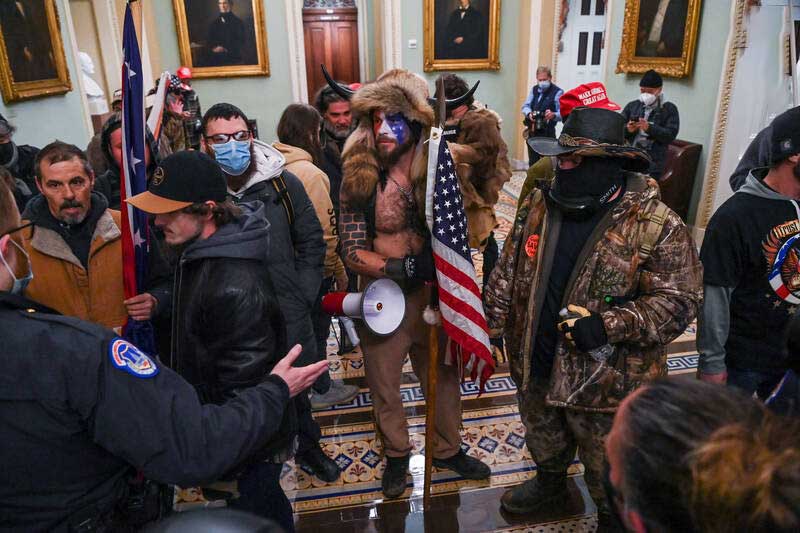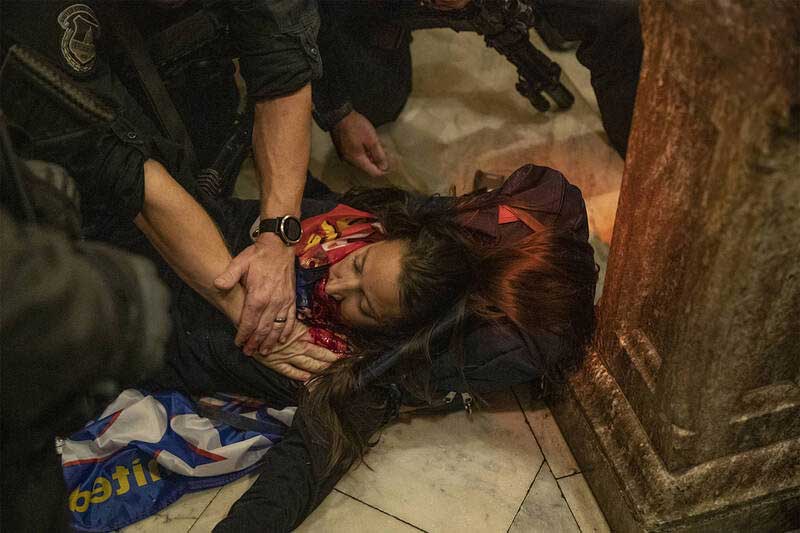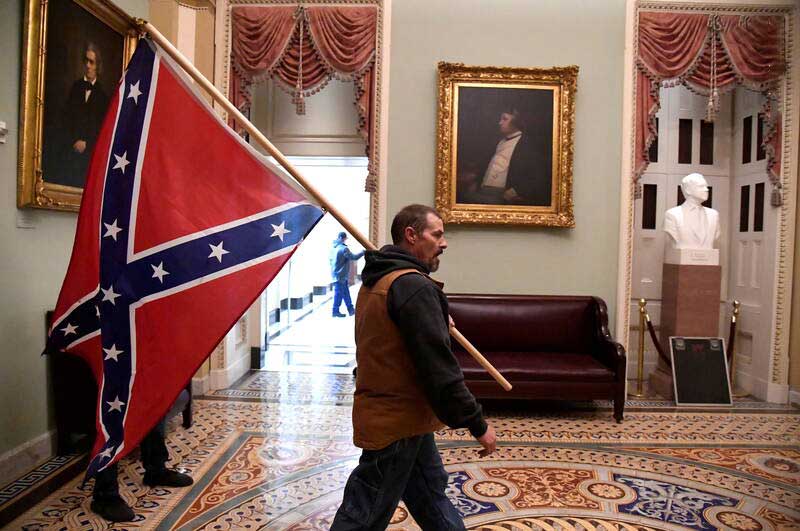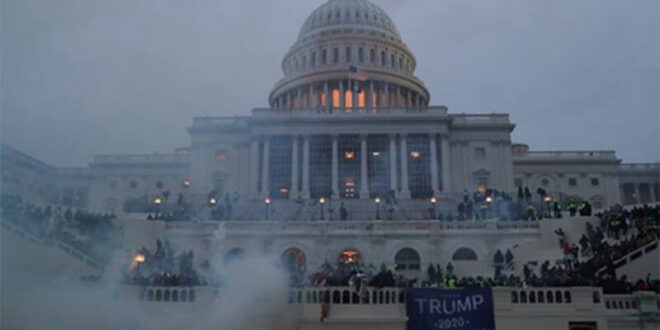Article – New York Times Note:
Francis Fukuyama: Attack on Congress was a sign of America’s decline / The American model of democracy is shattered
It should be noted that we publish this report only to inform the elites and political decision-makers of the country about the approaches and views of international media-think tanks. The views, claims and inductions of this report are not necessarily endorsed by us.

The “End of History” theorist sees last year’s attack on the US Congress as a turning point in US history and acknowledges that the American model of liberal democracy, which was to dominate the world, has been shattered.
THE MASHREGHNEWS WORLD SERVICE -A year since the American people’s attacked the US Capitol (January 6, 2021) in defense of Trump and protest of the results of the 2020 presidential election passed. Not only has the incident not diminished in importance, but various facts and analyzes have revealed other dimensions of this important turning point in US history. Leading experts have so far commented on what happened that day, and many have called it an “attack on American democracy.”

Hollywood style picture of protesters attacking the US Capitol on January 6, 2020
The New York Times recently published notes by several senior US analysts and former politicians, including former President Jimmy Carter, on the anniversary of the Jan. 6 attack on Congress. Among these notes is an article entitled” Just One Day. That was enough to turn the world around “By Francis Fukuyama, a famous American political scientist, author, and theorist.
Fukuyama is best known for his theory and book “The End of History and the Last Man” (a theory later refuted or publicly refuted by Fukuyama and others). He acknowledges in this memo that His predictions about the supremacy of the liberal-democratic system of government over the world were flawed, and among the developments that revealed this flaw was the events that took place in the US Congress a year ago. What follows is a translation of Fukuyama’s article in the New York Times.

American flag on fire; The New York Times has chosen this image, apparently taken on the day of the attack on Congress, as the main image of its report.
The January 6 attack on Congress by those influenced by former US President Donald Trump marked a milestone in the history of American politics. Since the American Civil War, never has the country had any problem with a peaceful transfer of power. No candidate before Trump had deliberately opposed the election results, which there is widespread evidence of free and fair elections.
Trump’s speech hours before protesters stormed the US Capitol
The effect of this event still exists in the American political climate. But its impact is not limited to the US. It also created a great international impact. It is a sign of the significant decline of US power and global influence. We must analyze January. 6 crises on Liberal Democracy globally. Democracy has been in decline for 15 consecutive years, according to the 2021 Freedom in the World think tank, and some remarkable setbacks in this area have been the share of the world’s two largest democracies, the United States and India. We have seen coups in Myanmar, Tunisia, and Sudan since the report was published. Those countries have already taken promising steps towards democracy.

The American eagle with its feathers down and its eyes blue; a copy of this image appeared on the cover of the well-known American magazine Foreign Affairs about the decline of the United States
From the early 1970s up to the financial crisis in 2008, the world faced a dramatic increase in the number of democracies from about 35 to more than 110. The United States played a vital role in a phenomenon called the “third wave” of democratization. Washington provided security for its democratic allies in Europe and East Asia. It took charge of a world economy that was becoming more integrated and quadrupled in production over the same period.
Moments of American protesters attacking the US Capitol in the early days of 2020
Nevertheless, the backbone of global democracy was the success and perpetuation of democracy in the United States itself; What the American political scientist Joseph Nye called “soft power.” People around the world looked to the United States as an example they wanted to emulate: from students at Tiananmen Square in 1989 to protesters who in the decades after that followed and led “color revolutions” in Europe and the Middle East.
The decline of democracy around the world is affected by complex factors. The processes of globalization and economic change have left many people behind, and a wide cultural gap has emerged between highly educated professionals living in cities and residents of smaller cities with more traditional values. The advent of the Internet has weakened elites’ control over information. Although we have always disagreed on values, we now live in different worlds where “reality” is quite different. And people’s desire to belong and affirm their dignity is often a stronger force than their economic interests.
The Iranian leader’s speech in November 2016 (about two months before the attack on the US Congress) on the “spectacular state” of democracy in the United States
So the world today is very different from the world it was almost 30 years ago when the former Soviet Union collapsed. There were two key factors that I [Francis Fukuyama] underestimated at the time: first, the difficulty of building not only Democracy, but also a modern, neutral, decline in advanced democracies.
The American model has been declining for a long time. The country’s political climate has been increasingly multipolar and intermittent since the mid-1990s; It has not allowed the government to perform even its basic tasks, such as approving the budget. American institutions, during this time, have grappled with visible problems (from the influence of money in politics [details] to the effects of a voting system that increasingly angled with democratic elections.
However, the United States does not seem to be able to reform itself. Previous periods of crisis, such as the Civil War and the Great Depression, led to the emergence of forward-looking and institutionalizing leaders; But this was not the case in the first decades of the twenty-first century; a period in which American policymakers marked two catastrophes (the Iraq war and the financial crisis with “second-tier” lending); and the period that then saw the emergence of short-sighted demagoguery based on an angry populist movement

The American protesters entered the congress building in sometimes strange clothes

A closer look at one of the American protesters who entered Congress with a strange appearance
Up to January. 6, these developments might be considered normal in American politics, such as disagreements about trade, immigration, and abortion. But the uprising that day marked a turning point in which a significant minority of Americans showed that they were willing to turn against the principle of American democracy and use violence to achieve their goals. What has turned January 6 into a worrying stigma (and gap) in American democracy is that Republicans are looking forward to the 2024 election (when Mr. Trump may be looking to return [to the race and power]).
They do not condemn the people who started and participated in the January 6 uprising. Worse than that, they seek to normalize the uprising and purge their various party ranks of those who agreed to tell the truth about the 2020 election.
Newt Gingrich, a Republican and former Speaker of the US House of Representatives, interviews Fox News about the importance of the 2020 presidential election and Trump’s chances of winning it.
The aftermath of January 6 is still on the world stage. For years, authoritarian leaders such as Russian President Vladimir Putin and Belarusian President Alexander Lukashenko have sought to manipulate the election results and deny the will of their people. On the other hand, the failed candidates in the elections of the nascent democratic systems have often claimed electoral fraud in elections that were almost free and fair.
Last year [2021] in Peru Keiko Fujimori did not accept his defeat in the second round of the presidential election against Pedro Castillo. Brazilian President Jair Bolsonaro criticized his country’s voting system work. He created the way for oppositions to oppose the outcome of this year’s made election; Just as Mr. Trump spent months leading up to the 2020 US presidential election undermining public confidence in “postal ballots.”
Ahead of the 2020 presidential election, Trump says he will only lose the election if Democrats manipulate the election with “postal votes.”
Until January 6, such atrocities were considered the behavior of young and imperfect democracies, and the United States shook its head in regret at such behavior. It is happening now inside the United States itself. America’s reputation as a practical model of a good democracy is shattered.

Ashley Babbitt, an American protester who was shot dead by security forces during an attack on the Congress building
The moment the congressional security forces fired on “Ashley Babbitt”, a woman who wanted to cross the security barriers on the day of the attack on the congress (contains heartbreaking images
January 6 is bad enough in itself, but the potential consequences could be even more dangerous. Two authoritarian and emerging countries have been at the forefront of the decline of democracy in the world: Russia and China. Both powers make accession claims to the territory of other nations. President Putin has publicly stated that he does not believe in the legitimacy of Ukraine as an independent state, but as part of a much larger Russia.
He has gathered his troops on Russian borders to estimate the West’s reaction to the possible attack on Ukraine. Chinese President Xi also stressed that Taiwan must eventually return to the country, and Chinese leaders have not ruled out using force if necessary. The key factor in any future military aggression by any of these countries will be the potential role of the United States. Washington has not given a clear security guarantee to Ukraine and Taiwan. The US has militarily and ideologically supported the two countries’ efforts to become real democracies.

A Chinese military H-6K bomber missions over the buffer zone between China and Taiwan in September 2020; The Biden administration has emphasized on paper its “firm” support for Taiwan’s security against China
If there was a movement within the Republican Party to condemn the events of January 6 (as Richard Nixon case in 1974), we may hope that the United States would pass Trump’s time. But it did not happen, and our foreign enemies, such as Russia and China, are watching this situation with great joy. When issues such as vaccination and masking become so politicized and divisive, imagine the fate of any future decision to offer (or not provide) military support to Ukraine or Taiwan. Mr. Trump has weakened the bipartisan consensus since the late 1940s on strong US support for his liberal international role, and President Biden has yet to re-establish that consensus.
America is back,” said President Joe Biden after coming to power and ostensibly ending the “Trump era
America’s great weakness today is internal strife. Conservative experts have traveled to illiberal Hungary to find an alternative [to the current model of governance], and a disappointing number of Republicans today see Democrats as a bigger threat than Russia. The United States has enormous economic and military power, but that power is unusable in the absence of a domestic political consensus on its international role. If Americans lose faith in an open, inclusive, and liberal society, America’s capacity to innovate and lead as the world’s leading economic power will diminish. January 6 fixed and deepened the rifts within the United States, and as a result, its consequences will continue to reflect around the world for years to come.

On the day of the attack on Congress, one of the American protesters carried the war flag of the US Allies. He crossed the security barrier and reached the second floor of the Palace of Congress, next to the entrance of the Senate. This flag was, in fact, the flag of the US Army in the US Civil War; Is this American protester aware of this historical fact and carrying the flag as the “flag of war” or, according to popular belief, simply holding it as the flag of the US Allies?
 Mouood Mouood English Edition
Mouood Mouood English Edition




